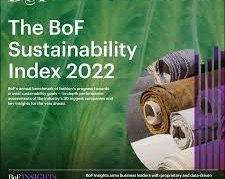The annual BoF Sustainability Index 2022 report on fashion's progress towards sustainability goals has been published, with in-depth assessments of the performance of the 30 largest companies in the sector. The results confirm that the fashion and sportswear industry need to engage more in good sustainability practices to transform the industry by 2030
The Business of Fashion Sustainability Index is in its second report, prepared by analyzing the information made public by the big brands about their environmental objectives and strategies, as well as the way in which respect for workers' rights is ensured.
The report was launched last year, and in its first edition it had analyzed 15 major brands, already doubled for this edition. The results demonstrated a deep gap between the publicly announced commitments and the strategies put in place.
The 2022 assessment spans across six impact categories: Emissions, Transparency, Water & Chemicals, Materials, Workers’ Rights and Waste. Results encompass over 9,000 data points, gathered across ~200 proprietary metrics applied to the 30 companies, enabling a like-for-like benchmarking of brands’ sustainability efforts — the most extensive assessment of its kind and the outcome of 1,000+ hours of research.
The report distinguishes brands into three categories: luxury, sportswear, and streetwear, and assesses the progress of companies in the field of sustainability and for the achievement of the 2030 goals. The analysis moves from the 200 parameters of impact of the fashion industry divided into six categories: emissions, water and chemicals, waste, materials, and workers' rights.
The aim of the document is to verify the commitments for the sustainability of the big fashion houses, in the face of the growing pressure towards these issues from consumers, especially the youngest. The report warned brands: continuing at this rate, companies risk losing cultural relevance and destroying their heritage.
The data that emerged are not encouraging: eight years after the achievement of the reference commitments, the sustainability performance of 5 out of 6 fashion houses has worsened: if last year there could be progress in the brands analyzed, having increased the cohort of evaluated this year significantly lowers the average.
The area on which companies have collected the most points is that of reducing emissions but have instead obtained exceptionally low scores about waste reduction.
The brands that performed well in the 15-man index last year confirm their leading role, but still too slowly. The original brands, in fact, increase the average score from 31 to 36 in a year. Most of the fashion companies added this year, on the other hand, need to make much greater efforts for sustainability, standing at an average score of just 20 points.
In general, there is no linear path: progress, although existing, is slow and discontinuous.
The average of the recorded scores is 28 out of 100. The first classified for commitment is PUMA, which however counts just 49 points out of 100 total. Next comes Kering, who was in first place last year. From third place onwards we find Levi Strauss, H&M Group and Burberry, the only new entry to reach the top 10 with 41 points.
Among the latter, we find URBN, Skechers, Fila Holdings, Anta and HLA Group – all brands that have scored less than 10 points because they have made few or no public commitments.


